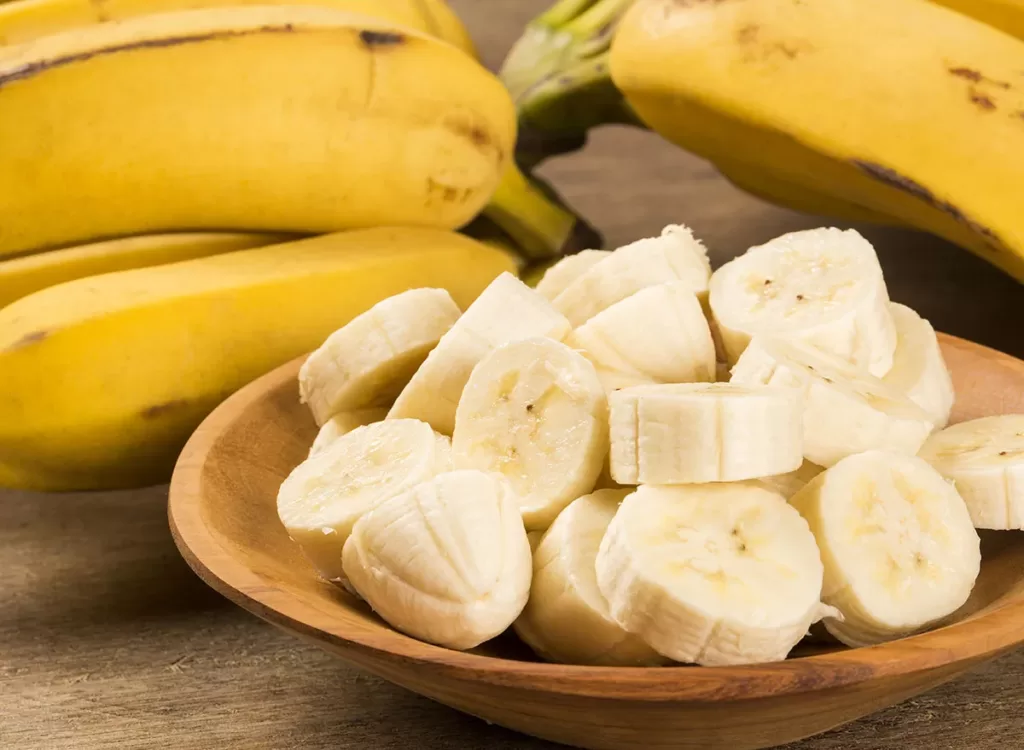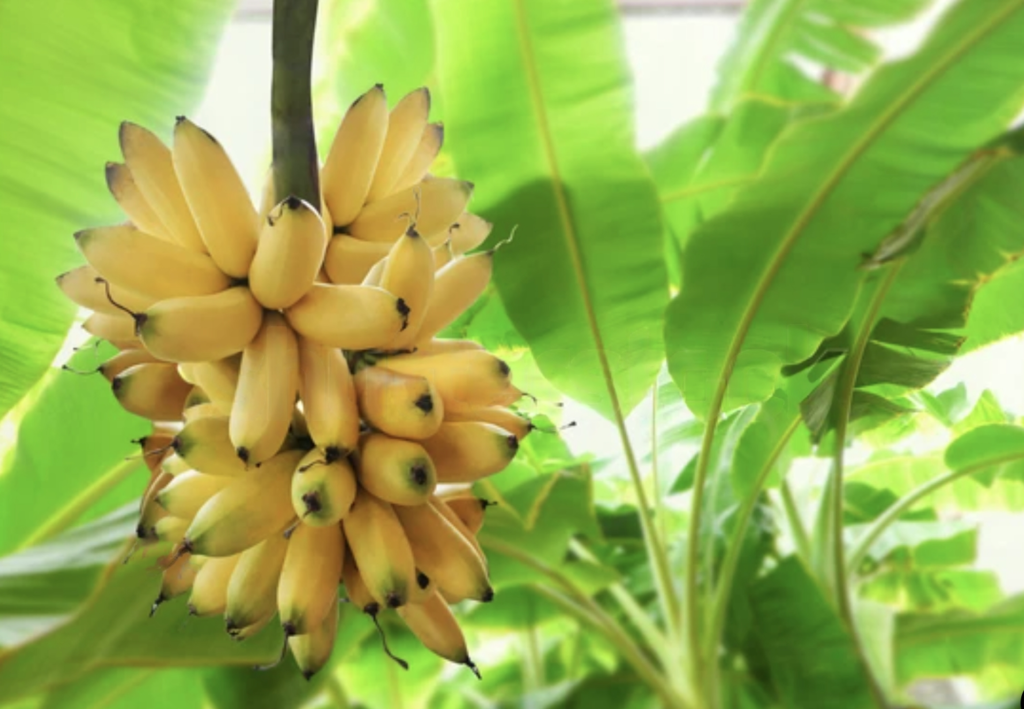Have you ever pondered the benefits of bananas? Bananas have a high vitamin B6 content and are also a nutritious source of vitamin C, fiber, and manganese. Bananas don’t contain any saturated fat, cholesterol, or a significant amount of sodium.
There is a reason why bananas are so widely consumed and used; they are incredibly convenient and widely consumed. The botanical name for this yellow fruit with an extended shape is a berry. It is a member of the family Musaceae and grows naturally throughout India.
The banana is a staple fruit in India. Use it in desserts and fruit salads. Raw fruit can be eaten, in addition to ripe fruit. We have heard right from our childhood days that ” an apple a day keeps a doctor away” and apart, apples are recommended by doctors as part of a healthy diet for maintaining overall wellness. But do you know that you can add bananas to your diet with the peace of mind that they are just as nutritious as apples? They are packed with beneficial nutrients that may have a preventative effect on health.

In this article, we will delve into the immense fruit that is so commonly seen and available throughout India that people perhaps do not attach much importance to its immense and amazing health effects. You will be really astonished to know how much the fruit is worth for the rich nutrient that it contains. The health implications of these factors are discussed. let’s dive straight into it.
The nutritional value of bananas
Bananas are a great source of fiber and a number of important vitamins, minerals, and nutrients, and they don’t add many calories to your diet. An average-sized banana (which the USDA estimates weighs 126 grams) provides your body with the following nutrients:
- 112 calories
- 15.4 grams of natural sugar
- 1.37 grams of protein
- 28.8 grams of carbohydrates
- 0.41 grams of fat
- 3.28 grams of total dietary fiber
- 6.3 grams of calcium
- 1.26 milligrams of sodium
- 34 milligrams of magnesium
- 11 milligrams of vitamin C
- 27.7 milligrams of phosphorous
- 0.33 grams of iron
- 451 milligrams of potassium
- 0.84 milligrams of niacin
Bananas are an excellent source of the antioxidants choline, selenium, vitamin A, carotene, folate, calcium, copper,, vitamin B6, riboflavin, zinc, and, vitamin K, all of which help protect cells from damage caused by free radicals.
Bananas—do they have any health benefits?
Bananas certainly have the potential to be a beneficial addition to a diet that is well-rounded. These foods are a good source of fiber, sugars that are naturally occurring, as well as critical trace elements. Bananas are packed to the brim with dietary fiber, vitamin B6, potassium, and antioxidants.
Many of us do not consume the daily amount of fiber that is suggested for women (21–25 grams) or the daily amount that is recommended for men (30–38 grams). Fiber has a crucial role in maintaining general health, including the health of the gut and the heart.
How many bananas shall you eat?
The Dietary Guidelines for Americans recommend that you eat 2 to 4 servings of fruit a day—and a half banana is one serving, “but there is no specific recommendation or hard rule about the number of bananas or any fruit you eat.”
Depending on a number of factors, “most adult Americans are advised to eat 1.5-2.5 servings of fruit every day, Thus, people’s daily fruit intake is proportional to their previous fruit intake.” intake,” a single banana of average size can fulfill the requirements for two portions of fruit.
The benefits of eating Bananas
Here are 14 uses for bananas that have been verified by research.
1. Improve gastrointestinal health by facilitating digestion
Eating bananas is not only good for your digestive health but also helps with the elimination of waste from your body. Bananas, as Best points out, are beneficial because they contain a lot of fiber, which aids in digestion and promotes regular bowel movements.
Unripe bananas are good for you because they contain resistant starch, a type of prebiotic fiber that feeds the “good” bacteria in your gut. Eating a banana twice a day before meals may help reduce bloating, as the potassium in bananas helps to reduce fluid retention and the increase in bloat-fighting bacteria in the gut microbiome.
2. Promote regular bowel habits
When you’re feeling backed up, your doctor may suggest eating a lot of fiber to help bulk up and soften your stool and get things moving again. Bananas, which are rich in fiber, maybe the secret to regular, effective bowel movements.
Pectin, a fiber present in both ripe and unripe bananas, can aid in maintaining regular bowel movements by making stools easier to pass and warding off constipation.
3. Maintains Blood pressure
Due to their high potassium content and low sodium content, bananas may aid in blood pressure regulation, as suggested by some studies. Bananas’ potassium content may help those who are trying to lower their blood pressure and maintain heart health.
Potassium is an important nutrient that supports heart health, Eating this tropical delicacy may, therefore, lower one’s risk of cardiovascular disease.
4. Controls blood sugar levels
A lot of the “a-peel” and attractiveness of bananas come from their inherent sweetness. Due to their sugary flavor, one might assume they interfere with glucose regulation. Researchers have found that bananas have a positive effect on blood sugar levels.
Because bananas have a low glycemic index, eating them regularly may assist in controlling one’s blood sugar levels and lessen the likelihood of developing type 2 diabetes.
5. Possibility of lowering free-radical levels
Free radicals can cause serious damage, but “bananas, like many other fruits and vegetables, contain antioxidants that are important for combating damage from free radicals. Free radicals in the body may build up over time, leading to chronic inflammation and disease.
6. Help with Muscle Growth and Post-Workout Recovery
Bananas’ high potassium content has multiple health benefits. The elemental electrolyte mineral “It is possible for it to dissociate into ions when it is immersed in water or body fluid. These ions contribute to the movement of nourishment into cells and waste products out of cells; in addition, they contribute to the healthy operation of nerves, muscles, the cardiovascular system, and the nervous system in general.
Because they contain electrolytes that are normally lost in sweat, bananas are a great post-workout snack for athletes and exercisers. Magnesium is an excellent nutrient for gaining muscle mass in a lean fashion because it facilitates muscle contraction, relaxation, and protein synthesis.

7. Improve slumber and mental health
Tryptophan, an amino acid found in bananas, has been shown to boost mood and alleviate depression symptoms. Similar to the effects of tryptophan, magnesium has been linked to better mental functioning, a more restful night’s sleep, and overall well-being. Eating bananas will give you 8 percent of the magnesium you need every day.
8. May lower inflammation
Bananas have been shown to have anti-inflammatory effects due to compounds like catechins and dopamine, which are found in them, as stated by Best.
One study published in PLOS One found that the carbohydrate content of bananas helped to reduce inflammation in cyclists who had just completed a ride of nearly 50 miles.
9. Enhances normal kidney function
Both the maintenance of appropriate kidney function and the regulation of blood pressure is critically dependent on potassium’s presence. Bananas, rich in potassium, may play a special role in preserving renal function. Potassium has been linked to reduced blood pressure and slower progression of kidney disease, according to a study involving over 5,000 people with initial-stage chronic kidney disease.
Bananas’ potassium content has been shown to have beneficial effects on kidney health, in addition to assisting with blood pressure regulation and support. Bananas are a great source of potassium, and eating them may lower your risk of developing chronic kidney disease, according to some studies.
However, those with end-stage renal disease or who are undergoing dialysis have a different situation and must limit their potassium intake. Increases in potassium intake should be discussed with your healthcare provider if you fit into any of the above categories.
10. Helps with energy and weight loss
Bananas are a great source of quick energy because they contain natural sugars like glucose, fructose, and sucrose.
The magnesium in bananas has been shown to aid in lipolysis, the physiological process by which your body converts fat stores into energy, so this nutrient may also contribute naturally to bananas’ energizing properties.
11. Potentially reduces the danger of cardiovascular disease
Best says that bananas’ high potassium content makes them a good choice for lowering blood pressure and protecting against heart disease.
Researchers have found that people whose diets are higher in potassium have a lower risk of cardiovascular disease, The potassium content of one medium banana is 10% of the daily value, so eating one every day might help prevent health problems.
Deficits in magnesium, “another mineral that is important for heart health,” may contribute to the onset of heart disease.
12. Possibility of making you feel fuller
Bananas’ soluble fiber may aid in satiety by increasing gastric bulk and decreasing digestive speed. Bananas also have few calories compared to how large they are. Bananas are more satisfying as a snack than foods like packaged or sugary packed snacks because they are both low in calories and high in fiber.
Bananas are low in protein, which is a macronutrient that contributes to fullness. If you’re feeling hungry, pair some sliced bananas with some protein, like Greek yogurt, or blend some bananas into a sports drink.
13. Rich in antioxidants
Bananas, like many other fruits and vegetables, are a great way to get antioxidants in your diet. Several different types of powerful antioxidants, such as flavonoids and amines, can be found in them.
According to the findings of a number of studies, anti-oxidants like those that can be found in veggies fruits and can have beneficial impacts on one’s health, including a reduced likelihood of developing age-related diseases and cardiovascular conditions.
They protect your cells from the oxidative damage that free radicals cause. Long-term exposure to high levels of free radicals without antioxidants can be harmful.
14. Possible benefits for heart health
The mineral potassium plays an important role in maintaining heart health, particularly in controlling blood pressure. Potassium is a vital nutrient, but most people don’t consume nearly enough of it. An easily accessible source of potassium, a single medium banana (126 grams) provides 10% of the daily value.

A high-potassium diet has been shown to be beneficial in reducing hypertension. Bananas also have magnesium, which helps keep your heart healthy, making them a good addition to your diet at 8% of your daily value. A diet that is deficient in magnesium may raise the risk of hypertension heart issues, and excessively high levels of blood fat. Because of this, it is extremely important to either ensure that you get enough of the mineral through your diet or take a supplement.
Disclaimer: This information is for educational purposes only, and no medical advice should be inferred from it. Before changing your diet or adding supplements, please talk to your doctor.
The author’s views are his or her own. The facts and opinions in the article have been taken from various articles and commentaries available in the online media and Eastside Writers does not take any responsibility or obligation for them.
Note: Contact our Writers at www.eastsidewriters.com for writing Blogs/Articles on any niche. We have experts in various domains from Technology to Finance and from Spirituality to Lifestyle and Entertainment.






